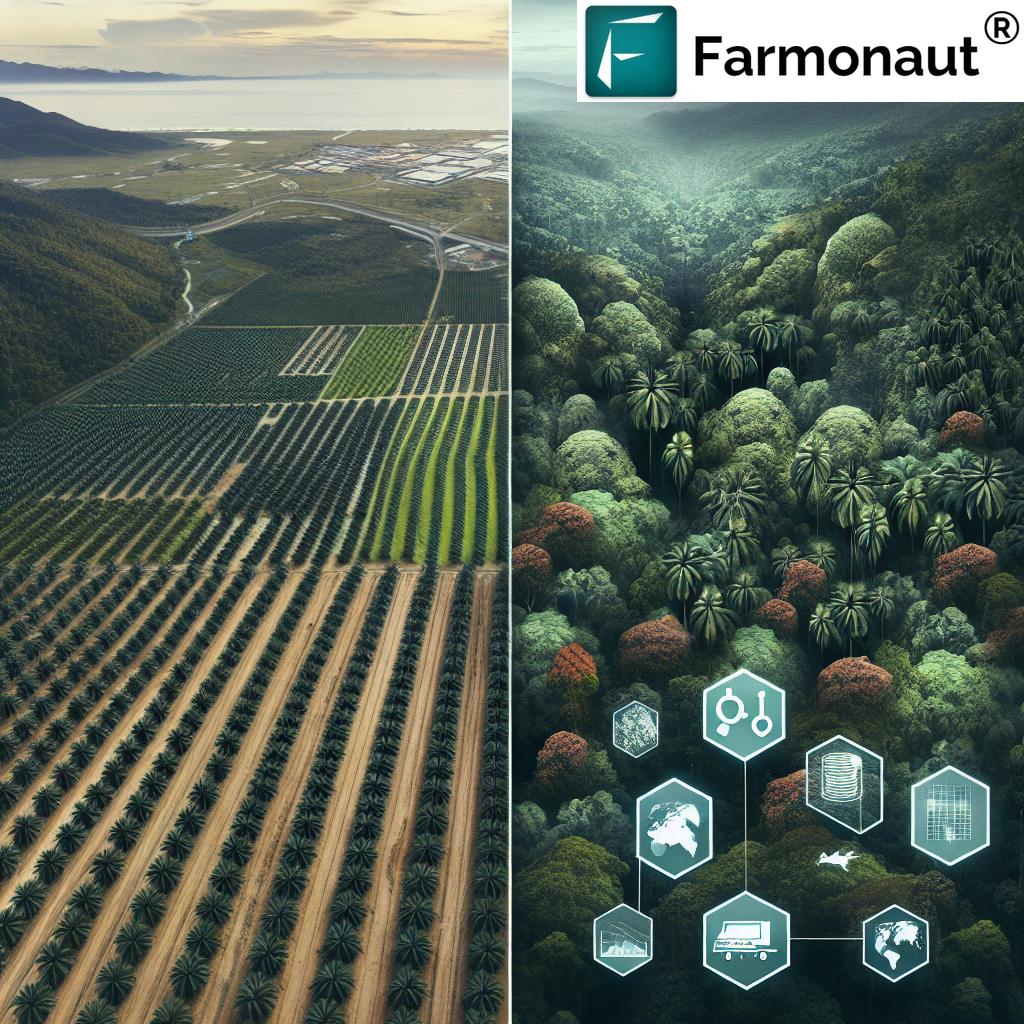Farmonaut’s Agritech Solutions: Tackling Deforestation and Human Rights in Fashion Supply Chains

“Women dominate the agricultural workforce, yet face systemic discrimination in 100% of deforestation-risk sectors.”
In an era where sustainable supply chains and ethical sourcing practices are more critical than ever, the fashion industry finds itself at a crossroads. As we approach the EU deforestation regulation deadline, companies are grappling with the interconnected challenges of forest risk commodity management and human rights protection. At Farmonaut, we recognize the urgent need to address these issues comprehensively, leveraging our agritech solutions for sustainability to provide valuable insights into managing these complex challenges.
In this blog post, we’ll explore the hidden human rights abuses in deforestation-risk sectors, examine the pressing concerns surrounding gender equality in agriculture, and assess industry commitments to combat these issues. We’ll also delve into how Farmonaut’s innovative technologies can contribute to a more sustainable and equitable industry.
The Hidden Cost of Fashion: Deforestation and Human Rights Abuses
The fashion industry’s global supply chains are often marred by a dark underbelly of environmental destruction and human exploitation. Deforestation, driven by the demand for materials like leather and cellulose fibers, has devastating consequences for both ecosystems and local communities. Simultaneously, workers in these sectors face a myriad of human rights abuses, including:
- Underpayment and exploitation
- Discrimination based on gender, ethnicity, or social status
- Forced labor and modern slavery
- Unsafe working conditions
- Limited access to healthcare and education
These issues are deeply interconnected, with deforestation often exacerbating human rights violations by displacing indigenous communities and disrupting traditional livelihoods.
The Gender Dimension: Women in Agriculture
One of the most pressing concerns in the agricultural sector, which feeds into the fashion industry’s supply chains, is the systemic discrimination faced by women. Despite dominating the workforce in many regions, women in agriculture continue to face significant challenges:
- Limited access to land ownership and financial resources
- Unequal pay for equal work
- Exclusion from decision-making processes
- Higher vulnerability to sexual harassment and gender-based violence
- Disproportionate burden of unpaid care work
Addressing these gender inequalities is not only a matter of human rights but also crucial for improving agricultural productivity and sustainability.
EU Deforestation Regulation: A Game-Changer for the Industry
As the EU deforestation regulation deadline approaches, fashion companies are scrambling to ensure compliance. This landmark legislation aims to prevent products linked to deforestation from entering the EU market, forcing businesses to implement robust due diligence processes in their supply chains.
“EU deforestation regulation deadline approaches, with less than 5% of companies fully prepared for compliance.”
Key aspects of the regulation include:
- Mandatory due diligence for companies placing forest-risk commodities on the EU market
- Traceability requirements to ensure products are deforestation-free
- Penalties for non-compliance, including fines and market exclusion
- Enhanced cooperation with producer countries to address root causes of deforestation
While the regulation primarily focuses on environmental protection, it also has significant implications for human rights in supply chains.
Industry Commitments: Progress and Pitfalls
Many fashion brands and retailers have made voluntary commitments to address deforestation and human rights issues in their supply chains. However, our assessment reveals significant gaps between these commitments and their practical implementation:
| Company Name | Deforestation-Free Commitments | Human Rights Policies | Supply Chain Transparency Score (1-10) | Compliance with EU Deforestation Regulation (%) |
|---|---|---|---|---|
| Fashion Giant A | 2030 Zero Deforestation Pledge | Comprehensive Human Rights Policy | 7 | 60% |
| Luxury Brand B | Sustainable Sourcing Initiative | Code of Conduct for Suppliers | 5 | 40% |
| Fast Fashion Retailer C | Green Collection Launch | Worker Welfare Program | 3 | 20% |
| Ethical Fashion House D | 100% Traceable Materials by 2025 | Living Wage Commitment | 9 | 80% |
| Sportswear Brand E | Circular Economy Initiative | Diversity and Inclusion Policy | 6 | 50% |
This comparative analysis highlights the discrepancies between corporate commitments and actual progress in addressing deforestation and human rights issues. While some companies have made significant strides, others lag behind, particularly in supply chain transparency and EU regulation compliance.
Farmonaut’s Agritech Solutions: A Path to Sustainability
At Farmonaut, we believe that innovative technology can play a crucial role in addressing the complex challenges of deforestation and human rights in fashion supply chains. Our suite of agritech solutions offers valuable tools for improving transparency, traceability, and sustainability:
- Satellite-Based Crop Health Monitoring: Our advanced satellite imagery technology allows for real-time monitoring of agricultural lands, helping to identify and prevent deforestation activities.
- Blockchain-Based Product Traceability: Our blockchain solution enables end-to-end traceability of fashion products, from raw materials to finished goods, ensuring transparency and accountability throughout the supply chain.
- Carbon Footprinting: Our carbon footprint tracking tools help fashion companies monitor and reduce their environmental impact, supporting efforts to combat deforestation and climate change.
- AI-Powered Advisory System: Our Jeevn AI provides personalized recommendations for sustainable farming practices, promoting responsible land use and resource management.
By leveraging these technologies, fashion companies can gain unprecedented visibility into their supply chains, identify potential risks, and implement targeted interventions to address both environmental and human rights concerns.

Integrating Human Rights Protections with Deforestation-Free Commitments
To truly address the interconnected challenges of deforestation and human rights abuses in fashion supply chains, a holistic approach is necessary. We recommend the following strategies for companies looking to improve their practices:
- Comprehensive Due Diligence: Implement robust due diligence processes that consider both environmental and social risks throughout the supply chain.
- Collaborative Partnerships: Engage with local communities, NGOs, and other stakeholders to develop inclusive and sustainable solutions.
- Invest in Technology: Utilize advanced technologies like Farmonaut’s satellite monitoring and blockchain traceability to enhance supply chain visibility and accountability.
- Empower Women in Agriculture: Implement targeted programs to support women farmers, including access to training, resources, and leadership opportunities.
- Promote Sustainable Production Methods: Encourage and support suppliers in adopting environmentally friendly and socially responsible production practices.
- Transparent Reporting: Regularly disclose progress on deforestation and human rights commitments, using standardized metrics and third-party verification.
The Role of Consumers and Financial Institutions
Addressing deforestation and human rights issues in fashion supply chains is not solely the responsibility of brands and retailers. Consumers and financial institutions also play crucial roles in driving change:
Consumer Awareness and Action
- Educate yourself about the environmental and social impacts of fashion
- Support brands with strong sustainability and ethical practices
- Demand transparency and accountability from fashion companies
- Participate in advocacy efforts for stronger regulations and industry standards
Financial Institutions’ Influence
- Implement rigorous ESG criteria for investments in the fashion sector
- Provide financial incentives for sustainable and ethical business practices
- Support the development of innovative technologies for supply chain management
- Engage with companies to improve their environmental and social performance
By leveraging their purchasing power and investment decisions, consumers and financial institutions can create significant pressure for positive change in the fashion industry.
Farmonaut’s Commitment to Sustainable Fashion
At Farmonaut, we are dedicated to supporting the fashion industry’s transition towards more sustainable and ethical practices. Our agritech solutions offer powerful tools for managing complex supply chains, monitoring environmental impacts, and promoting responsible sourcing. By partnering with fashion brands, retailers, and suppliers, we aim to create a more transparent, accountable, and sustainable industry.
To learn more about how Farmonaut can support your sustainability efforts, explore our range of solutions:
Download our mobile apps for on-the-go access to our powerful tools:
Looking Ahead: The Future of Sustainable Fashion
As we move towards 2024 and beyond, the fashion industry faces both challenges and opportunities in addressing deforestation and human rights issues. The implementation of the EU deforestation regulation will undoubtedly accelerate progress, but true transformation will require ongoing commitment, innovation, and collaboration across the entire value chain.
By embracing technologies like those offered by Farmonaut, fashion companies can gain the insights and tools needed to create truly sustainable and ethical supply chains. As we continue to develop and refine our solutions, we remain committed to supporting the industry’s journey towards a more responsible and equitable future.
Conclusion: A Call to Action
The time for decisive action on deforestation and human rights in fashion supply chains is now. As the EU deforestation regulation deadline approaches, companies must act swiftly to ensure compliance and address the interconnected challenges of environmental protection and social responsibility.
At Farmonaut, we stand ready to support this crucial transformation with our cutting-edge agritech solutions. By combining satellite technology, AI, and blockchain, we offer powerful tools for enhancing supply chain transparency, monitoring environmental impacts, and promoting sustainable practices.
We call on fashion brands, retailers, suppliers, consumers, and financial institutions to join us in this effort. Together, we can create a fashion industry that not only respects our planet but also upholds the dignity and rights of all workers involved in bringing beautiful garments to life.
Let’s work towards a future where sustainable supply chains and ethical sourcing practices are not just aspirations, but the norm in the fashion industry. The challenges are significant, but with commitment, innovation, and collaboration, we can create lasting positive change.
FAQ Section
Q: How does deforestation in fashion supply chains impact human rights?
A: Deforestation often leads to displacement of indigenous communities, loss of traditional livelihoods, and increased vulnerability to exploitation. It can also exacerbate climate change, which disproportionately affects marginalized populations.
Q: What are some key challenges in implementing deforestation-free commitments?
A: Challenges include limited supply chain visibility, complex multi-tier supplier networks, lack of standardized traceability systems, and competing economic pressures.
Q: How can technology help address human rights issues in fashion supply chains?
A: Technologies like satellite monitoring, blockchain traceability, and AI-powered risk assessment can enhance supply chain transparency, identify potential abuses, and support targeted interventions.
Q: What role do consumers play in promoting sustainable and ethical fashion?
A: Consumers can drive change by supporting brands with strong sustainability practices, demanding transparency, and advocating for stronger industry regulations.
Q: How will the EU deforestation regulation impact the fashion industry?
A: The regulation will require companies to implement robust due diligence processes, ensure traceability of materials, and potentially reshape their supplier relationships to comply with stricter environmental standards.
















